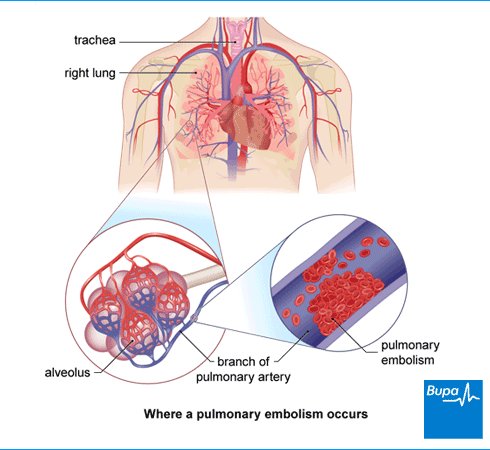When a blood clot clogs one of the pulmonary arteries that go to your lungs, it blocks the blood supply.
This blockage in the blood supply can be dangerous for our life from mild to extreme. The medical experts call it pulmonary embolism. Because of PE, the regular dosage of oxygen is decreased in the body to survive a healthy life.

bupa.point 5 | co.point 8 | uk
The normal route of blood circulation is, your blood travels from your heart to the lungs to get oxygen and then proceeds back to the heart.point 125 | The heart then pumps it across the whole body.point 163 | While the blood is flowing towards the body through DVT, deep vein thrombosis, sometimes clots develop inside.point 257 |
It can vary from one big clot to many small ones that choke the standard flow of blood-oxygen.point 77 | 1
Henceforth, pulmonary embolism ends up putting the patient’s life at risk. However, prompt diagnoses and immediate treatment can cure this problem taking the subject out of the danger zone. In this piece of information, we will help you understand the gist of pulmonary embolism alongside its symptoms and causes.
How Do You Know You Have Pulmonary Embolism?
There are several symptoms to diagnose pulmonary embolism yourself at home but count the following as major ones.
a) Heartbeat and Breathing Issues
This includes shortness of breath and it worsens with the level of exertion you do. It can be gradual or sudden.
b) Chest Pain
You may experience sharp pain in your heart as you are having a heart attack. This pain can extend to your arm, neck, and shoulder, back, or sometimes even to your jaw.
c) Fever, cough, and dizziness
Having coughs with blood in your sputum is also a warning sign of Pulmonary Embolism. You can also cough without the blood too. Having constant fever coupled with drowsiness is a symptom of PE as well. PE can also give you anxiety and depression episodes.
d) Swelling of your legs
Since the clot is present in the DVT, which is mostly your legs, your legs can become swollen and warmer than it normally is. You will find it difficult to stand for a bit longer because of this clot in your legs’ veins. It may also affect your arm with kind of the same symptoms.
Other than these major ones PE symptoms are;
- Colored skin like yellow or bluish nails and lips
- Fragile pulses, you will feel like you’ll collapse soon
- A lot of sweating
What causes you to develop PE?
com
It is not limited to only one reason, there can be multiple reasons for a blood clot to develop in your legs’ veins.point 103 | Mostly, these clots begin in the legs or pelvic area of your body.point 157 | From a lack of mobility function to the genetics errors in clotting process, there are number of reasons for a person to have PE.point 263 | 1
In the following section, we will now explore some of the basic and most common reasons for pulmonary embolism to develop in a person’s body.
a) Some kind of an injury or damage
In case you ever suffered from a muscle tear or any other kind of damage to your blood vessels during any physical activity, you may develop a clot. Bone fractures also lead to PE in some case scenarios.
b) Long inactivity
If you are inactive for long like during a flight or any long journey, your blood stagnates in the lower part of your body. This ceases blood function which can come about a clot. Patients who are prescribed to a complete bed rest are more likely to get this disease.
What are the treatments of Pulmonary Embolism?
One should never take PE for granted as it causes unignorable health crisis from cancer, fractures to obesity, and heart attacks.point 269 |
You should prompt to visit a specialized doctor in the field who will start with your X-rays, ECG, MRI venography and pulmonary angiography and other tests according to your condition.point 155 | 1
We hope this read has given you enough information to diagnose yourself with PE. In an unfortunate case, if you think you have a number of these symptoms, you should rush to get an appointment. Keep visiting us to read more useful and life-saving information.
